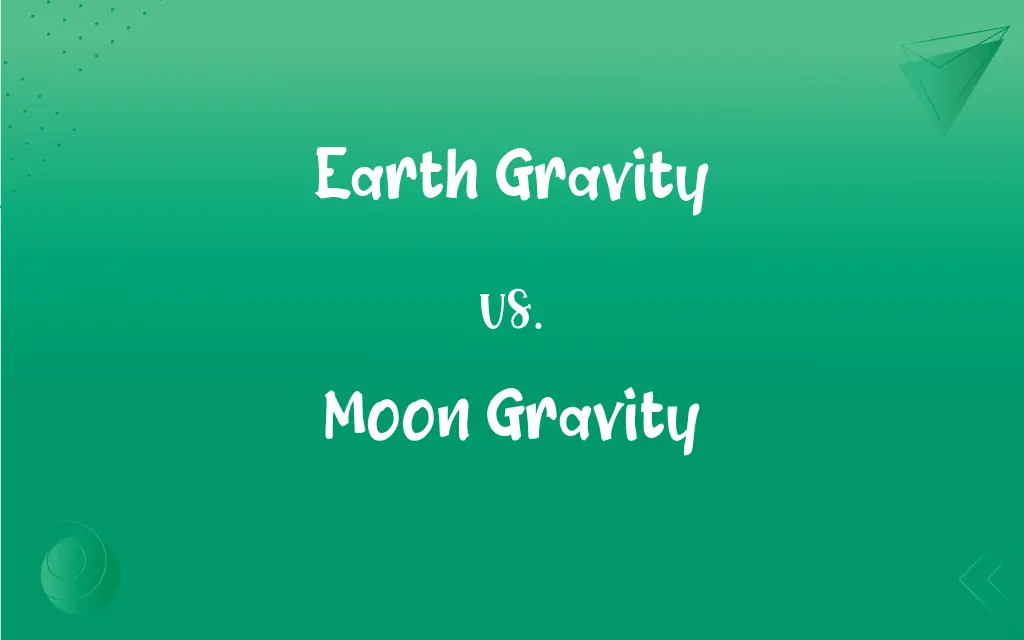Earth Gravity vs. Moon Gravity: What's the Difference?
Edited by Aimie Carlson || By Harlon Moss || Updated on October 4, 2023
Earth Gravity is the force pulling objects towards Earth's center, while Moon Gravity, about 1/6th as strong, pulls objects towards the Moon's center.

Key Differences
Earth Gravity is a fundamental force that operates on our planet. It's responsible for the attraction of objects towards Earth's center, giving weight to physical objects. On the other hand, Moon Gravity, while operating on similar principles, exerts a force that is approximately one-sixth of Earth's gravitational pull. This difference is mainly due to the Moon's smaller mass compared to Earth.
Both Earth Gravity and Moon Gravity play crucial roles in their respective celestial bodies. Earth Gravity is vital for various phenomena, from keeping the atmosphere intact to forming tides in the oceans. Moon Gravity, despite being weaker, significantly impacts the Earth by influencing tidal movements in our oceans.
Furthermore, Earth Gravity defines many of our everyday experiences. It determines how much objects weigh, and it affects the trajectory of anything thrown or dropped. Moon Gravity, on the other hand, would feel very different. Astronauts on the Moon's surface experienced this reduced gravity, leading to higher jumps and slower falls.
Lastly, while Earth Gravity ensures that water remains liquid and creates atmospheric pressure suitable for life, the reduced Moon Gravity does not hold a significant atmosphere, leading to vastly different environmental conditions.
Comparison Chart
Strength
Strong gravitational pull
About 1/6th the strength of Earth's gravity
ADVERTISEMENT
Effects on Bodies
Determines weight, holds atmosphere, forms ocean tides
Influences Earth's tides, less force on surface objects
Experience
Responsible for normal walking and falling speeds on Earth
Would result in higher jumps and slower descents
Role in Atmosphere
Helps retain a thick atmosphere conducive for life
Insufficient to hold a thick atmosphere
Origin
Result of Earth's mass and density
Result of Moon's smaller mass and density
Earth Gravity and Moon Gravity Definitions
Earth Gravity
Earth Gravity gives weight to all objects based on their mass.
Heavier objects are more influenced by Earth Gravity.
ADVERTISEMENT
Moon Gravity
Moon Gravity is the force exerted by the Moon pulling objects towards its center.
Moon Gravity affects astronauts, allowing them to jump higher.
Earth Gravity
Earth Gravity is responsible for the planet's atmospheric retention.
Earth Gravity keeps our atmosphere intact, allowing for breathable air.
Moon Gravity
Moon Gravity plays a role in creating Earth's tides.
The ebb and flow of tides are influenced by both Earth Gravity and Moon Gravity.
Earth Gravity
Earth Gravity determines the motion of objects falling towards Earth.
Objects fall faster due to Earth Gravity.
Moon Gravity
Moon Gravity is about one-sixth the strength of Earth's gravitational force.
Due to weaker Moon Gravity, things weigh less on the Moon.
Earth Gravity
Earth Gravity is the force exerted by Earth pulling objects towards its center.
Without Earth Gravity, we'd float away into space.
Moon Gravity
Moon Gravity affects the motion of objects on its surface.
Objects dropped on the Moon fall slower due to its reduced gravity.
Earth Gravity
Earth Gravity is essential for maintaining the planet's liquid oceans.
Earth Gravity ensures that our oceans don't escape into space.
Moon Gravity
Moon Gravity isn't strong enough to retain a significant atmosphere.
The Moon's thin atmosphere results from its weaker gravity.
FAQs
Is weight the same on Earth and the Moon?
No, an object weighs less on the Moon due to its weaker gravity.
What is Earth Gravity?
Earth Gravity is the force that attracts objects towards the center of the Earth.
Does Earth Gravity affect the Moon?
Yes, Earth Gravity affects the Moon, keeping it in orbit around the Earth.
Why do astronauts jump higher on the Moon?
Due to the reduced Moon Gravity, there's less force pulling them down.
Is there any atmosphere on the Moon?
The Moon has a very thin atmosphere, which is not retained well due to its weaker gravity.
Can Moon Gravity affect Earth's crust?
Yes, the gravitational pull of the Moon can cause Earth's crust to bulge slightly, leading to tides.
Why do we feel Earth Gravity?
Because Earth's mass exerts a force on all objects, pulling them towards its center.
How did scientists measure Moon Gravity?
Through experiments during lunar missions and observing the motion of objects on the Moon's surface.
Does Earth Gravity affect airplanes?
Yes, airplanes counteract Earth Gravity with lift to stay airborne.
Would liquid act differently under Moon Gravity?
Yes, with weaker gravity, liquids would form taller droplets and pour more slowly.
What would happen if Earth Gravity suddenly disappeared?
Everything unattached would float away, the atmosphere would disperse, and the planet might disintegrate.
Is gravity the same on all planets?
No, gravitational force varies based on a planet's mass and radius.
Why do objects fall at the same rate in a vacuum on Earth?
Because Earth Gravity acts on them equally, and there's no air resistance in a vacuum.
How does Moon Gravity differ from Earth Gravity?
Moon Gravity is approximately one-sixth the strength of Earth Gravity.
Why do tides occur on Earth?
Tides are influenced by the gravitational forces of both the Moon and the Earth.
Would Earth Gravity change if Earth's mass changed?
Yes, gravity is directly related to mass. More mass means stronger gravity.
How do spacecraft escape Earth's gravitational pull?
They achieve a velocity known as escape velocity, which overcomes Earth Gravity.
Does the distance from the Moon's center affect Moon Gravity?
Yes, gravity decreases with increased distance from a celestial body's center.
How does Moon Gravity affect lunar missions?
It influences landing dynamics, astronauts' mobility, and how spacecraft take off from the Moon.
Can we simulate Moon Gravity on Earth?
Not globally, but reduced-gravity environments can be simulated using special facilities or aircraft.
About Author
Written by
Harlon MossHarlon is a seasoned quality moderator and accomplished content writer for Difference Wiki. An alumnus of the prestigious University of California, he earned his degree in Computer Science. Leveraging his academic background, Harlon brings a meticulous and informed perspective to his work, ensuring content accuracy and excellence.
Edited by
Aimie CarlsonAimie Carlson, holding a master's degree in English literature, is a fervent English language enthusiast. She lends her writing talents to Difference Wiki, a prominent website that specializes in comparisons, offering readers insightful analyses that both captivate and inform.






































































